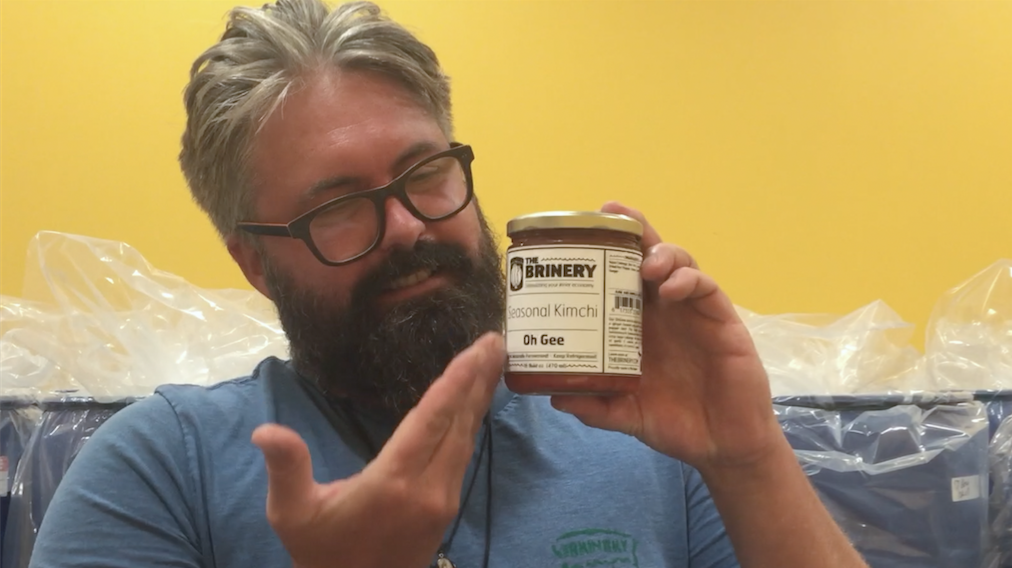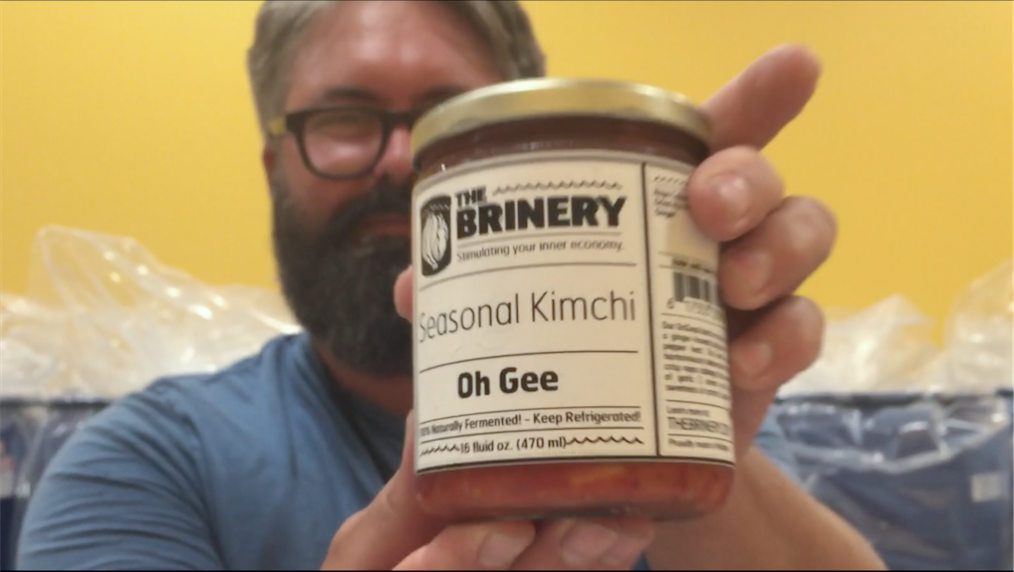
Recently, I was able to speak with David Klingenberger, founder of The Brinery in Ann Arbor. He had some wonderful insight into “Compassionate Capitalism,” starting a new business, and how his personal passions and background are integral to his work. Here’s our conversation from inside The Brinery itself:
Can you start with telling me who you are and what you do?
“I’m David Klingenberger, CFO (Chief Fermenting Officer, that is) of The Brinery. The Brinery is a fermented foods business, so we specialize in raw, naturally fermented vegetables. We make hot sauce, kimchi, pickles, sauerkraut, tempeh…” he gestures to the barrels and boxes of fermented vegetables around us.
“I first fermented vegetables at the turn of the century. I was a young farm lad,” he says with a laugh, “and I was interested in all things food: hand-to-mouth, growing food, feeding people…and food preservation is the natural extension of growing food in a local food economy. Fermenting vegetables was to me the coolest form of food preservation, so I really came to this as a lover of the culture of culturing food.”
What’s your favorite part about being a business owner?
“You know, there’s some peaks and valleys. I’m an entrepreneurial type, so I feel like a lot of my strengths are also my downfalls. But when it comes down to it, I’m always into feeding people. I try to practice ‘compassionate capitalism.’ If the whole socioeconomic system fell apart, I would still feed people. It’s not like an app or a video game—this is food. Even if there was a zombie apocalypse, we would still have something of value and be able to feed people. So if there’s a zombie apocalypse…come to The Brinery for some sauerkraut.”
At this point, it’s clear that Klingenberger doesn’t let business get in the way of having fun. He holds up a jar of kimchi, gesturing toward it as if it’s a piece of art.
What did you do before starting The Brinery?
“I was a farmer, a sailor, a general vagabond, hitchhiker, freight train rider, dreamer, rapscallion maybe? I’m 37 now, and I started The Brinery when I was 30. In my 20’s I went between farming and sailing and doing a little environmental education with kids.”
It’s both refreshing and inspiring that a humorous dreamer-rapscallion could become such a successful business owner by the simple act of following his passion for vegetables.
Would you say that you are happier after starting your own business?
“I feel I have potential to take this business from good to great—and by that I mean scaling up sustainably, with our heart and our spirit intact, without ‘selling out,’ whatever that means to you. I started this business starting from my ‘gut brain’ and not my ‘lizard brain,’ and it was fun. I started it not because I had a vision of ‘This is my ten-year plan and I’m gonna be a millionaire by this point,’ I just truly wanted to do something that felt really good, and that was good for my community, and was feeding people. And so now I have a real business (we’re in over 400 stores across the midwest, I have 12 employees…) it can be stressful at this scale, and thinking about scaling up and still maintaining an adventuresome spirit, but that challenge is my greatest adventure—and I love adventures.”
What advice do you have for anyone thinking about starting their own business?
“I would say if you really wanna go for it, go for it. And trust your gut. You have to believe in what you’re doing, and find something that you’re truly passionate about. The success of The Brinery came from both my ambitious spirit but also picking a product that resonated with myself and the greater community.
“But here’s my advice: trial it out. Do a living and breathing, real-world study. Don’t go to business school and write a business plan for 10 years—find a small group of people and make your thing, and get it in their mouths (or get it in front of them) and then if there’s a really great response to it and you think you could actually do it, then scale up. I think a lot of people are like, ‘It’s gotta be perfect,’ but maybe you gotta just lay that egg, and make an omelette with it, and feed it to people. And then you’ll get feedback.
“That’s how I started the Brinery: I started by making sauerkraut with excess cabbage from Tantre Farms, and without a license or any business plan. I just started making it and putting it into unlabeled jars and selling it to people I had known through the farming community. And they knew me because I had built social capital by selling them produce for 10 years. They knew my face, they trusted me because I had been part of the local foods community, and so I sold them sauerkraut. And people were like ‘This is good, we want more,’ and so I built off of that. But I got told early on to pay all this money to take a week-long business course and write a business plan, but my business plan was making a product and getting it in front of real people. And the feedback I got was enough for me to say ‘There’s something viable here.’ Of course you should be competent and you should have a business plan, but make your thing and get it in front of real people—that’s my best advice.”
Is there anything else you want to add?
“Buy Brinery products at your local store! We have fun naming our products, and that’s part of the authenticity of our business. We’re making cultured food, and part of that is the culture we bring to it—that human element. And that’s the fun and playfulness of it.
“But also, trust your gut brain. People tell you your product needs to ‘solve a problem,’ and some people invent a problem just to ‘solve’ it. My opinion is that everyone needs to eat nutritious food, and these fermented vegetables are integral to proper digestion, immune system, heck, even happiness—the bacteria in your gut are related to the serotonin production in your brain. So I feel kind of okay being a zealot about it. So I’d say trust your gut-brain and make something that’s absolutely necessary for your community.”
And with that, Klingenberger got back to work, leaving me with a smile, a jar of kimchi and a desire to keep supporting the local food community.
If you’re interested, you can buy Brinery products here, or at the closest Whole Foods.

